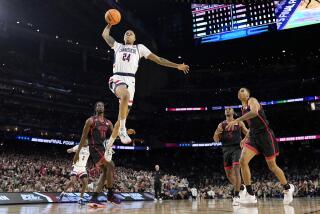Study Charges Sexism in Women’s Sports Coverage : Television: An Amateur Athletic Foundation survey cites CBS, KNBC, USA and ESPN.
- Share via
CBS, KNBC Channel 4, and cable’s ESPN and USA networks were accused of sexism in their coverage of women’s sports in a study released Wednesday by the Los Angeles-based Amateur Athletic Foundation.
“The study found that women’s sports is underreported and that what coverage does exist is inferior to that afforded men’s sports,” Amateur Athletic Foundation President Anita DeFrantz said in a statement. “These findings are significant in that the way in which television covers, or fails to cover, women engaged in athletics affects the way in which female athletes are perceived and also tells us something about the status of women in our society.”
The researchers examined coverage of the 1989 U.S. Open Tennis tournament (carried on both CBS and USA), the 1989 men’s and women’s college basketball championships and sports news coverage on KNBC from July 2-Aug. 15, 1989.
The events were chosen because they were among the few in which both men and women competed and a basis for comparison was possible, according to Patrick Escobar, an Amateur Athletic Foundation vice president. KNBC was chosen because it had the highest-rated local newscasts in Los Angeles and sportscaster Fred Roggin had won a 1989 Golden Mike Award.
The study criticized KNBC for depicting women as “humorous sex objects” in its use of taped footage of women spectators.
The study said that of 264 minutes of total sports coverage over the six-week period, 244 minutes (92%) were devoted to men’s sports, 12 minutes (5%) to women’s sports and eight minutes (3%) to gender-neutral sports.
KNBC’s longest single sports story during the study was a 3-minute, 50-second profile of “Morgana, the Kissing Bandit” who had gained a measure of fame for running onto baseball fields and kissing players.
“We cannot comment as we have not received a full copy of this survey,” said Regina Miyamoto KNBC spokesperson. “We do not understand how any survey can distribute such findings without having a fair and balanced sampling of all stations’ newscasts within the market.”
In women’s college basketball coverage on CBS and ESPN, “significant differences in the quality of the production tend to trivialize the women’s games, while framing men’s games as dramatic spectacles of historic significance,” according to the study. The researchers also claimed that far more on-screen graphics, slow-motion replays and cameras were used for men’s sports than women’s.
“We have a lot of pride in the quality of our coverage of the women’s championship game,” CBS Sports spokeswoman Susan Kerr said. She said CBS devotes more hours of coverage to women’s sports than any other network and will increase its coverage this season.
The 36-page study also was critical of sports announcers on CBS, ESPN and USA for “infantilizing” women basketball and tennis players by identifying them by their first names more often than the men.
Diana Nyad, a U.S. Open commentator for the USA network for the past two years, took issue with the study.
“At USA, I can’t think of any sexism that goes on over here,” Nyad said.
One reason women tennis players may be referred to on a first-name basis more often than men, is that teen-age girls can reach the top levels of the sport faster than teen-aged boys, she said.
“When someone gets to be a hero by being around so long and the public adores them, you windup calling them by their first name,” said Nyad, a former ABC sportscaster and record-setting distance swimmer. “If you dug up all the coverage of Jimmy Connors for the past 10 years, you’d find announcers refer to him as Jimmy 90% of the time.”
ESPN could not be reached for comment at press time.
The study was conducted by Margaret Duncan, assistant professor in the Department of Human Kinetics at the University of Wisconsin at Milwaukee, and Michael Messner, assistant professor of sociology and the study of women and men in society at USC.
The Amateur Athletic Foundation awards grants to Southland youth sports groups, initiates regional youth sports programs and manages the Paul Ziffren Sports Resource Center, North America’s largest sports library.
More to Read
Go beyond the scoreboard
Get the latest on L.A.'s teams in the daily Sports Report newsletter.
You may occasionally receive promotional content from the Los Angeles Times.










